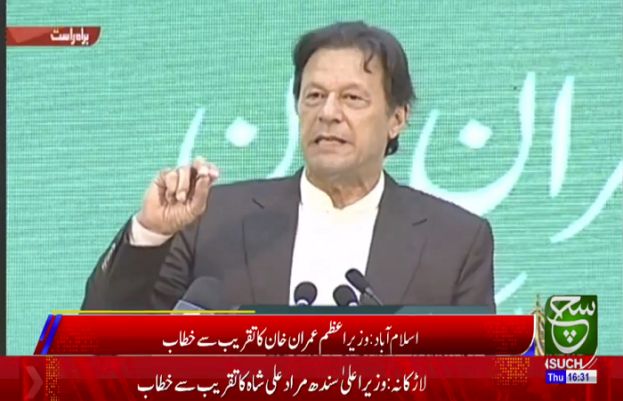
Addressing a ceremony at the Academy of Literature after inaugurating the Hall of Fame, the premier began by highlighting the role of scholars during the golden age of Islam. "Scholars played a massive role [during that time] ... when a civilisation is on the path to progress, they make scholars their role models. They give a sense of direction to a nation."
But when scholars go astray, then the civilisation declines, he said. "Scholars guard a nation's point of view."
The premier also lamented the fact that citizens were not informed about the history of Islam. "They are not aware that this was the biggest revolution, that there is no other parallel [in history]."
He said that Holy Prophet (Peace Be Upon Him) had brought about an "intellectual revolution" and not one through the sword. "People's characters changed."
He added that it was necessary to inform the younger generation of this revolution as they were facing "immense pressure" due to social media and media in general. "Today, a child has access to content through his mobile phone, which on one hand provides knowledge and is positive, but on the other it is X-rated."
That's why the country's scholars, TV and film producers have a great responsibility towards the younger generation, he said.
"You can't close down social media. It is a reality," he said, adding that several times he has been informed about objectionable content on social media. "I inform the Pakistan Telecommunication Authority and they block the site, but the next day another one pops up."
So while we can't stop social media, we can equip our children with the necessary information and teach them how to deal with such content, he said.
Circling back to the importance of scholars, the premier called them "opinion-makers". "They protect the direction a nation is heading in, and teach people how to differentiate between good and bad."
Calling the decline of the country's morality and ethics as the "biggest crisis", he said that he is always asked why he is after "two big families" for doing corruption — an apparent reference to the Sharifs and Bhutto-Zardaris.
"I don't have anything personal against them, in fact I used to be friends with them." He noted that the revolution Holy Prophet (PBUH) had introduced was based on morality, to encourage the good and to condemn the bad.
"A nation dies when it loses the ability to differentiate between good and bad [...]. When you see something wrong and don't call it out, that means that your decline has begun."
PM Imran also said that there was a massive difference between the morality and ethics of Western countries as compared to ours. He said that money has no standing in the British parliament, unlike the Senate of Pakistan where there are countless allegations of horse-trading.
The premier noted that the country was faced with two challenges; the first being that people had accepted corruption, and the second was social media.
"People tell me that you don't shake the hand of the opposition leader. [But] he is facing corruption allegations worth billions. If I shake his hand, I make it [the crime] acceptable in society."
Once again giving the example of England, he said that a minister who was facing corruption allegations was not allowed to enter parliament until he was cleared of the charges.
"Their standards are higher than ours and that is why I have made the Rehmatul-lil-Alameen Authority, the purpose of which is to provide children with a role model; Holy Prophet (PBUH)."
He noted that closing down social media was not an option, and the younger generation should be informed about the qualities of one of the world's greatest leaders. "If we want to uplift the ethics of our society, we need to give our children an alternate message."
Concluding his speech, the prime minister said that the government will "honour and raise the level" of scholars in society. "But you will have to take responsibility for an intellectual revolution in society."
He stated that he was informed by provincial police chiefs that sex crimes were on the rise in the country, and highlighted the benefits and cons of mobile phones. "Three years ago, the entire nation stood up for the Zainab case. Now you read the newspapers and see a multitude of such news, but there is no reaction."
He noted that the material from Pakistani films was being sourced from Bollywood, which had taken it from Hollywood. "We don't envisage the repercussions of the culture that is coming in."
He said that Indian films had changed drastically over the last few decades. "New Delhi is called the rape capital. We take in that culture and it has its effects. So, this is where scholars come in and have to guide society."
from latest-news - SUCH TV https://ift.tt/3EI8i7s



0 تبصرے